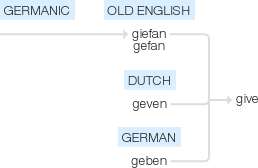Give
Old English giefan, gefan, of Germanic origin; related to Dutch geven and German geben .
wiktionary
From Middle English given, from Old Norse gefa(“to give”), from Proto-Germanic *gebaną(“to give”). Merged with native Middle English yiven, ȝeven, from Old English ġiefan, from the same Proto-Germanic source (compare the obsolete inherited English doublet yive).
give (plural gives)
etymonline
give (v.)
Old English giefan (West Saxon) "to give, bestow, deliver to another; allot, grant; commit, devote, entrust," class V strong verb (past tense geaf, past participle giefen), from Proto-Germanic *geban (source also of Old Frisian jeva, Middle Dutch gheven, Dutch geven, Old High German geban, German geben, Gothic giban), from PIE root *ghabh- "to give or receive." It became yiven in Middle English, but changed to guttural "g" by influence of Old Norse gefa "to give," Old Danish givæ.
Meaning "to yield to pressure" is from 1570s. Give in "yield" is from 1610s; give out is mid-14c. as "publish, announce;" meaning "run out, break down" is from 1520s. Give up "surrender, resign, quit" is mid-12c. To give (someone) a cold seems to reflect the old belief that one could be cured of disease by deliberately infecting others. What gives? "what is happening?" is attested from 1940. To not give a (some thing regarded as trivial and valueless) is from c. 1300 (early examples were a straw, a grass, a mite).
give (n.)
"capacity for yielding to pressure," 1868, from give (v.). The Middle English noun yeve, meant "that which is given or offered; a contribution of money," often as tribute, or in expectation of something in return.
